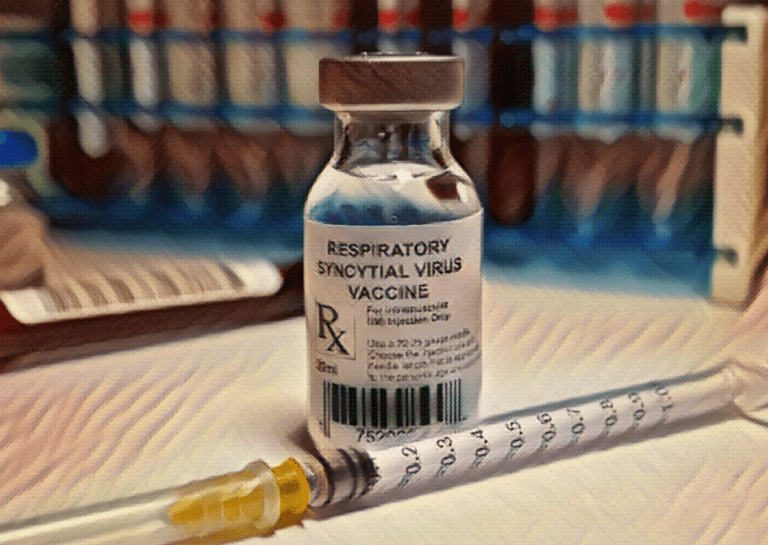Respiratory Syncytial Virus (RSV) is the main cause of Bronchiolitis, a lower respiratory tract infection, in younger children and can be severe in some cases. RSV is considered a potentially fatal respiratory infection that can particularly affect children under the age of two. The virus causes inflammation of the small airways (bronchioles), partially or completely blocking the airways. This causes wheezing (a whistling sound heard as the child breathes out).
Bronchiolitis is a common cause of illness and is the leading cause of hospitalization in infants and young children.
Table of contents
Causes
RSV outbreaks usually occur from November to April with a peak in January or February. In the southern hemisphere, wintertime epidemics occur from May to September, with a peak in May, June, or July. In tropical and semitropical climates, seasonal outbreaks usually are associated with the rainy season.
Virtually everyone will have been infected with RSV by the age of three years. It is common to be infected more than once, even in the same RSV season; however, subsequent infections are usually milder.
During the COVID-19 Pandemic, there has been a remarkable reduction in respiratory viral infections other than Covid-19. This means that there is an increasing number of young children who have never been exposed to these common viruses like RSV.
Symptoms
Parents are being encouraged to look out for symptoms of severe respiratory infection in at-risk children.
The symptoms of RSV that parents should look for include:
- A high temperature of 100.4°F or above
- A dry and persistent cough
- Difficulty feeding, and rapid or noisy breathing.
- Breathing rapidly (60 to 80 times per minute) or with mild to severe difficulty
- Persistent coughing, which may last for 14 or more days (persistent cough also may be caused by other serious illnesses that require medical attention)
- In an infant, Apnea (a pause in breathing for more than 15 or 20 seconds) can be the first sign of bronchiolitis and occurs more commonly in infants born prematurely and infants who are younger than two months.
Parents of young children under 1-year-old, along with adults over 65 or those with chronic illnesses, should monitor for more severe symptoms like trouble breathing or eating.
The good news for parents is that the concerning symptoms are not subtle. If your child cannot eat or drink normally or is having trouble breathing, they need to be evaluated by a medical professional.
Newborn infants could have no symptoms then become incredibly ill, so parents should be extra cautious taking them out if RSV is spreading in their area.
Treatment
Treatment includes measures to ensure that the child consumes adequate fluids and is able to breathe without significant difficulty. According to research, RSV is the most common cause of lower respiratory tract infection (LRTI) in children <1 year of age. Most cases of RSV or bronchiolitis are mild and can be managed at home, but about 3% of cases will need hospital care. RSV can be more severe in premature babies, those under two months old, and children with certain underlying conditions, such as those born with a heart condition.
Prevention
Due to this increased activity, the CDC encourages broader testing for RSV among patients presenting with acute respiratory illness who test negative for COVID-19. They also advised healthcare workers to stay home if they’re feeling sick, even if they’ve tested negative for COVID-19. The best forms of prevention for RSV are similar to the recommendations for COVID-19 — wash hands regularly, avoid touching unnecessary surfaces and stay home if you’re sick.
Limit visitors when you have a newborn to hopefully decrease the likelihood of passing RSV or another germ onto a baby.
References
- Piedra, P. A., & Stark, A. R. (2021, July). Patient education: Bronchiolitis (and RSV) in infants and children (Beyond the Basics). Uptodate.
- Hall CB, Weinberg GA, Iwane MK, et al. The burden of respiratory syncytial virus infection in young children. N Engl J Med 2009; 360:588.
- Ralston SL, Lieberthal AS, Meissner HC, et al. Clinical practice guideline: the diagnosis, management, and prevention of bronchiolitis. Pediatrics 2014; 134:e1474.
- Merrick, J. (2021, July 23). Health Chiefs preparing for triple threat from Covid, flu and RSV in worst case Scenario winter. inews.co.uk. https://inews.co.uk/news/politics/health-chiefs-preparing-for-triple-threat-from-covid-flu-and-rsv-virus-in-worst-case-scenario-winter-1117986.
- Mazziotta, J. (2021, August 25). Rare summertime cases of rsv are spiking again in these 6 states. PEOPLE.com. https://people.com/health/rare-summertime-cases-of-rsv-are-spiking-again-in-these-6-states/.
- MediLexicon International. (n.d.). Have COVID-19 LOCKDOWNS affected our immune systems? Medical News Today. https://www.medicalnewstoday.com/articles/how-have-pandemic-lockdowns-affected-the-immune-system.
- The National Respiratory and Enteric Virus Surveillance System (NREVSS). (2021, August 25). RSV National Trends – NREVSS. Centers for Disease Control and Prevention. https://www.cdc.gov/surveillance/nrevss/rsv/natl-trend.html.
